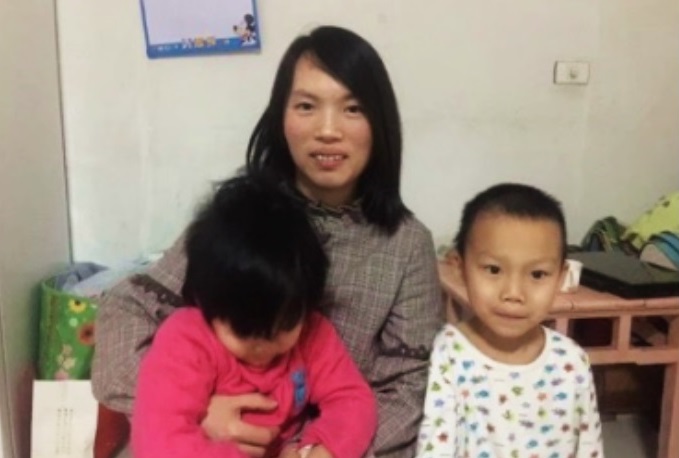Unequal law, the suffering children of Chinese dissidents
Chinese Human Rights Defenders released a report detailing the stories of children and young people victims of human rights violations, like He Fengmei's daughter, who was separated from her mother a month after her birth and kept in a psychiatric hospital in Henan. In another case, a boy is rejected by schools because his lawyer father defends activists. In Xinjiang children are placed in boarding schools as "orphans" to uproot them from their families.
Milan (AsiaNews) – Repression against all forms of dissent in the People's Republic of China affects even the very young, this according to a new report released yesterday by Chinese Human Rights Defenders (CHRD), a coalition of Chinese and international human rights non-governmental organisations dedicated to human rights in China.
Titled If I disobey, my family will also suffer, the study looks at the state of human rights in China in 2023, focusing on forms of collective punishment that affect the families of those who fight for freedom in the country.
In addition to the arrests of spouses or forced separations of members of the same family, what is striking are the stories about various forms of intimidation that directly target the children of dissidents.
A case in point is that of He Fengmei (pictured), a Henan woman jailed for protesting in 2020 against unsafe Chinese anti-COVID-19 vaccines. Police arrested her first, then her husband in October 2020.
She was jailed along with her six-year-old son and four-year-old daughter at the Henan Xinxiang Gongji Psychiatric Hospital. At the time, she was five months pregnant.
In February 2021, she gave birth to a daughter; a month later, she was arrested and transferred to a Xinxiang detention centre, separating her from the newborn, who was left in the psychiatric hospital along with her other children.
The son was later placed in foster care, without the consent of the parents or next of kin, while the two daughters remained in the psychiatric hospital despite the pleas of relatives to entrust them to their care.
When Ms He's lawyers finally got permission to visit her in prison for the first time in late 2022, they tried to see the girls in the psychiatric hospital as well, but were pushed back at the gate by security guards who said they had no knowledge about it.
In early 2024, a group of activists reported that local government officials went to He Fangmei's brother's home to get the detainee's 75-year-old mother to waive custody of her grandchildren.
On 1 April, the two girls – due to pressures – were taken from the psychiatric hospital but it is not clear where they are now.
Another reported case involves the four children of activist-artist Wang Zang, who was jailed in 2020, and his wife, who was also detained between 2020 and 2022.
Wang’s mother stepped in to take care of the children, but police still put her under strict surveillance, going so far as to prevent her from receiving packages from friends and benefactors with food and clothes for the children.
After the mother’s release on 16 December 2022, the children returned with her, but the threats did not end. In Chuxiong, police ordered her to stop posting on social media about her incarcerated husband or she would risk seeing her children end up in an orphanage.
Another prominent case concerns Quanquan, the son of human rights lawyer Wang Quanzhang, who was released from prison in June 2020 but subjected to very strict surveillance measures that also impacted the child's life.
Last October, he passed an interview and a written test for admission to a new school. His parents had paid the tuition and enrolled Quanquan in the fifth grade. But he was only able to attend for one day before the school administration gave in to pressure from the authorities and withdrew his admission.
Last month, 20 police showed up at a middle school in Guangdong province just ten days after the boy started attending. His mother felt helpless: “He was once again forced out of school!”
Another form of pressure is to deny children a passport, which prevents them from going to study abroad.
Human rights lawyer Li Heping was detained from July 2015 to April 2017 and sentenced to three years for "subversion of state power”.
His wife Wang Qiaoling has written extensively about the government's repeated efforts to prevent their children from getting a proper education.
In an essay, she sadly recounted that her son, then 17, no longer even wanted to apply to go to foreign universities. “He looked up at me and said, ‘Mom, forget it. Even if I get an offer, I can’t get a passport and go.”
Finally, a separate chapter concerns the children in the autonomous regions of Tibet and Xinjiang, separated from their parents due to the Chinese government's campaigns to "hit hard" the local cultural and religious identity, seen as dangerously secessionist for Beijing.
According to UN sources, as many as one million Tibetan children are forced to attend boarding schools, which are designed to assimilate them into the Han majority culture.
In Xinjiang, the state-run boarding school system is being expanded to admit very young children. Taken from their parents who "are in exile or interned”, they are treated as "orphans" by Chinese authorities.
15/06/2021 17:33







.png)










